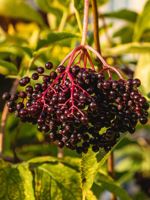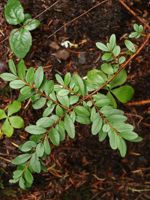Mon-Fri 9am - 5pm Mountain time
Bob Gordon Elderberry vs Falsebox
Sambucus canadensis Bob Gordon
Paxistima myrsinites
CUSTOM GROW
Bob Gordon Elderberry is a Black Elderberry cultivar that produces berries that are larger and sweeter than other varieties, making it one of the top cultivars. It produces large clusters of white flowers that turn into large clusters of dark purple to black berries. The berries are well-suited for baked goods, jams, jellies, and syrups. It was selected from the wild in Missouri.
The large berry clusters that the Bob Gordon Elderberry produces will often end up hanging downward. This makes it more difficult for birds to feed on the berries. If birds are a concern, this might be the right berry for you.
Black Elderberries are considered to be partially self-pollinating. So while they will still produce some berries without cross-pollination, planting with another variety will increase yields. Consider planting with Black Elderberry or Ranch Elderberry.
Warning: the seeds, stems, leaves, roots, and uncooked berries are toxic to humans when eaten in quantity. Berries should be cooked to make them safe for human consumption.
Falsebox is a hardy, native evergreen shrub found in forests, rocky slopes, and open woodland sites. Though small and easily overlooked among the leaves, the maroon flowers still supply nectar and pollen for pollinators such as native bees and flies. Blooming in spring, they provide an important early-season food source. Its year-round greenery adds visual interest through the winter.
Falsebox is a low-growing shrub that tolerates a wide range of conditions, including drought once established. It thrives particularly well beneath the shade of mature trees, where few other plants succeed. With its resilience and ecological value, Falsebox is well-suited for naturalization, restoration projects, and diverse landscape plantings.
Bob Gordon Elderberry Quick Facts
Falsebox Quick Facts
Toxicity: leaves, stems, and uncooked berries are poisonous to humans

